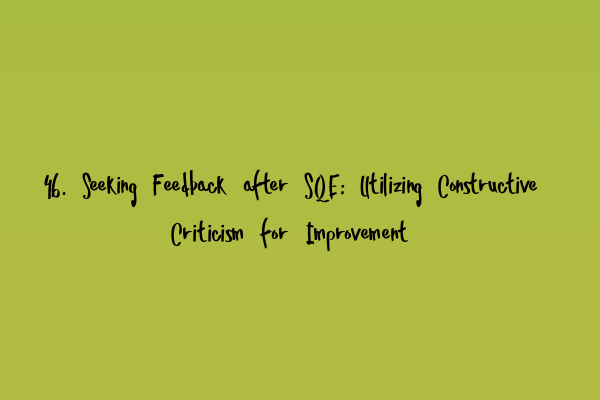46. Seeking Feedback after SQE: Utilizing Constructive Criticism for Improvement
Completing the Solicitors Qualifying Examination (SQE) is a significant milestone on your journey to becoming a qualified solicitor. After putting in countless hours of study, preparing for the exams, and finally completing them, it’s natural to want to know how you did. Seeking feedback and utilizing constructive criticism is a crucial step towards improving your skills and ensuring success in your legal career.
Feedback provides valuable insights into your strengths and weaknesses, allowing you to identify areas where you excelled and areas that require improvement. By understanding the specific areas in which you can enhance your knowledge and skills, you can work towards maximizing your potential and achieving your goals.
So, how can you effectively seek feedback after taking the SQE exams? Here are a few strategies that can help:
1. Reflect on Your Performance
Before seeking feedback from others, take the time to reflect on your own performance. Analyze your answers, review the questions, and identify areas where you struggled or felt uncertain. This self-reflection will help you have a more informed discussion with those providing feedback and allow you to ask targeted questions.
It’s also important to keep in mind that everyone makes mistakes or has areas where they can improve. Don’t be too hard on yourself if you didn’t achieve a perfect score. Instead, focus on learning from the experience and taking steps to enhance your skills moving forward.
If you want to learn more about self-reflection and analyzing your mock results, check out our related article: Analyzing Mock Results for SQE: Identifying Areas of Improvement.
2. Approach your Assessors
Your assessors are an excellent resource for feedback and guidance. Reach out to them and inquire about their observations and assessments of your performance. They can provide specific insights into your strengths and weaknesses, highlight areas for improvement, and offer suggestions for further development.
Engaging in a discussion with your assessors not only helps you gain valuable feedback but also demonstrates your commitment and eagerness to learn. Take their feedback seriously and use it as a constructive tool to enhance your future performance.
3. Seek Feedback from Fellow Candidates
Connecting with fellow candidates who also completed the SQE can offer a unique perspective. Discuss your experiences with them, and open up about your strengths and weaknesses. By sharing knowledge and exchanging feedback, you can gain insights into different approaches and viewpoints that may have been missed during your individual study process.
Sharing experiences and insights can lead to a mutually beneficial learning opportunity for all parties involved. Collaborating with fellow candidates can also help you form study groups or engage in mock discussions, further enhancing your overall preparation for future exams.
If you’re interested in exploring case studies and applying your knowledge in real-life scenarios, read our related article: SQE Case Studies: Applying Knowledge in Real-Life Scenarios.
4. Use Online Forums and Communities
Online forums and communities dedicated to the SQE are an excellent resource for seeking feedback and advice. Participate in discussions, ask questions, and share your experiences. By engaging with individuals who have already taken or are preparing for the SQE, you can tap into a wealth of knowledge and gain various perspectives.
Be open to receiving feedback and suggestions from the online community. While not all advice may be applicable to your situation, you might come across valuable insights that can help you improve your performance in future exams.
5. Turn Feedback into Actionable Steps
Feedback is only useful if you are willing to act upon it. Once you have received feedback, take the time to analyze and distill it into actionable steps. Identify specific areas for improvement and create a study plan that targets those weaknesses. Implementing a structured approach to addressing your shortcomings will help you make significant progress and stay focused on your goals.
For tips on time management and strategies for efficient exam completion, check out our related article: Mastering Time Management in SQE: Strategies for Efficient Exam Completion.
Conclusion
Seeking feedback after completing the SQE exams is a vital step towards personal and professional growth. By reflecting on your performance, engaging with assessors and fellow candidates, utilizing online forums, and turning feedback into actionable steps, you can maximize the benefits of constructive criticism.
Remember, constructive criticism is not meant to discourage you, but to guide you towards improvement. Embrace feedback as an opportunity to enhance your skills, expand your knowledge, and excel in your legal career.
If you want to learn more about conquering the multiple-choice questions (MCQ) in SQE1, check out our related article: Conquer the Multiple Choice Questions (MCQ) in SQE1.
